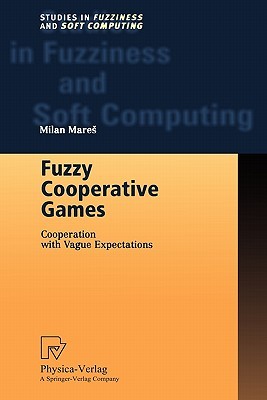
- We will send in 10–14 business days.
- Author: Milan Mares
- Publisher: Physica Verlag
- Year: 2010
- Pages: 177
- ISBN-10: 3790824895
- ISBN-13: 9783790824896
- Format: 15.6 x 23.4 x 1 cm, minkšti viršeliai
- Language: English
- SAVE -10% with code: EXTRA
Reviews
Description
The present book deals with coalition games in which expected pay-offs are only vaguely known. In fact, this idea about vagueness of expectations ap- pears to be adequate to real situations in which the coalitional bargaining anticipates a proper realization of the game with a strategic behaviour of players. The vagueness being present in the expectations of profits is mod- elled by means of the theory of fuzzy set and fuzzy quantities. The fuzziness of decision-making and strategic behaviour attracts the attention of mathematicians and its particular aspects are discussed in sev- eral works. One can mention in this respect in particular the book Fuzzy and Multiobjective Games for Conflict Resolution by Ichiro Nishizaki and Masatoshi Sakawa (referred below as [43]) which has recently appeared in the series Studies in Fuzziness and Soft Computing published by Physica-Verlag in which the present book is also apperaing. That book, together with the one you carry in your hands, form in a certain sense a complementary pair. They present detailed views on two main aspects forming the core of game theory: strategic (mostly 2-person) games, and coalitional (or cooperative) games. As a pair they offer quite a wide overview of fuzzy set theoretical approaches to game theoretical models of human behaviour.
EXTRA 10 % discount with code: EXTRA
The promotion ends in 22d.15:19:13
The discount code is valid when purchasing from 10 €. Discounts do not stack.
- Author: Milan Mares
- Publisher: Physica Verlag
- Year: 2010
- Pages: 177
- ISBN-10: 3790824895
- ISBN-13: 9783790824896
- Format: 15.6 x 23.4 x 1 cm, minkšti viršeliai
- Language: English English
The present book deals with coalition games in which expected pay-offs are only vaguely known. In fact, this idea about vagueness of expectations ap- pears to be adequate to real situations in which the coalitional bargaining anticipates a proper realization of the game with a strategic behaviour of players. The vagueness being present in the expectations of profits is mod- elled by means of the theory of fuzzy set and fuzzy quantities. The fuzziness of decision-making and strategic behaviour attracts the attention of mathematicians and its particular aspects are discussed in sev- eral works. One can mention in this respect in particular the book Fuzzy and Multiobjective Games for Conflict Resolution by Ichiro Nishizaki and Masatoshi Sakawa (referred below as [43]) which has recently appeared in the series Studies in Fuzziness and Soft Computing published by Physica-Verlag in which the present book is also apperaing. That book, together with the one you carry in your hands, form in a certain sense a complementary pair. They present detailed views on two main aspects forming the core of game theory: strategic (mostly 2-person) games, and coalitional (or cooperative) games. As a pair they offer quite a wide overview of fuzzy set theoretical approaches to game theoretical models of human behaviour.


Reviews